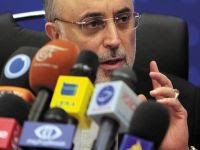Iran to propose a comprehensive plan to resolve the crisis in Syria
Iranian Foreign Minister, Ali Akbar Salehi, said Monday that his country has presented the quartet mediator (Egypt, Iran, Turkey and Saudi Arabia) a comprehensive plan to resolve the crisis in Syria. The plan proposed has six points, two of them call for the cessation of violence and national dialogue.

The comprehensive plan proposed by Iran to resolve crisis in Syria has six points, two of them call for the cessation of violence and national dialogue. The international quartet is seeking a negotiated solution without foreign interference.
Iranian Foreign Minister, Ali Akbar Salehi, said Monday that his country has presented the quartet mediator (Egypt, Iran, Turkey and Saudi Arabia) a comprehensive plan to resolve the crisis in Syria, in which armed groups have engaged in violent terrorist acts from March 2011, to overthrow Syrian President, Bashar Al Assad.
"We have offered a comprehensive plan of six points to end the Syrian crisis which calls for the cessation of violence and for national dialogue," Salehi said at the opening of a forum of Muslim academics on Islamic Awakening.
He reiterated his country's criticism of the selective approach to the problem called for by western powers and a diplomatic solution to the Syrian crisis.
Ali Akbar Salehi referred to the first round of Syrian National Dialogue held in this capital last November, saying that "the main opposition forces believe in dialogue, but while these conversations are pressing forward, terrorists attack the people and Government."
Iran, along with Saudi Arabia, Turkey and Egypt, forms an integrated mediator quartet formed weeks ago at the initiative of Egyptian President, Mohamed Morsi.
Morsi declared himself in favor of a negotiated solution without foreign interference in the crisis in Syria of 19 months duration caused by armed gangs seeking to overthrow Assad.
The Damascus government informs that foreign powers orchestrated a plan to discredit and destabilize the country, accusing the executive of exerting strong repression on civilians, which the Executive has denied each time.
The European Union (EU), with the United States and other Arab countries, has in recent months led several rounds of sanctions against Damascus, personalities and companies to apply pressure so that Al Assad would leave power.
Meanwhile, NATO's ill-advised decision to send Patriot missles to Turkey to further inflame the region was answered by a Russian shipment of Iskander missles to Syria.
The superior Iskander can travel at hypersonic speed of over 1.3 miles per second (Mach 6-7) and has a range of over 280 miles with pinpoint accuracy of destroying targets with its 1,500-pound warhead, a nightmare for any missile defense system. The Iskandar is a surface-to-surface missile that no missile defense system can trace or destroy,
The west has been increasingly trying to escalate and expand the conflict in their utter desperation to achieve their goals of global domination, which necessitates the elimination of an indepedent Syria.. The have begun a preparatory phase, necessary for all wars of aggression, by laying an intensive propaganda groundwork for a false flag chemical attack that will give them a reason to attack Syria.
It is obvious that one side seeks peace and negotiation, while the other rattles the sword with belligerence, blackmail and violence. We also see that they were the first to up the ante by the weapons delivery to Turkey. If they continue, this isn't going to end well. Perhaps the Mayan caldendar ending scenario isn't so unlikely after all.
Translated from the Spanish version and appended by:
Lisa Karpova
Pravda.Ru
Subscribe to Pravda.Ru Telegram channel, Facebook, RSS!


